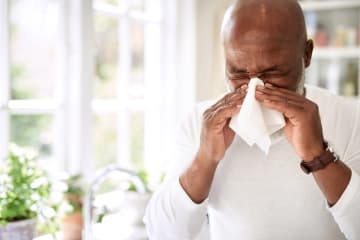
Overview
Allergies occur when your body's defense system (immune system) overreacts to certain substances. The immune system treats a harmless substance as if it were a harmful germ or virus. Many things can cause this to happen.
Your allergies are seasonal if you have symptoms just at certain times of the year. In that case, you are probably allergic to pollens from certain trees, grasses, or weeds.
Allergies can be mild or severe. Over-the-counter allergy medicines, such as nasal sprays, eye drops, or pills, may help with some symptoms. Read and follow all instructions on the label.
Your doctor may suggest that you have tests to help find the cause of your allergies. When you know what things trigger your symptoms, you can avoid them. This can prevent allergy symptoms and other health problems.
In some cases, immunotherapy might help. For this treatment, you get shots or use pills that have a small amount of certain allergens in them. Your body "gets used to" the allergen, so you react less to it over time. This kind of treatment may help prevent or reduce some allergy symptoms.
Follow-up care is a key part of your treatment and safety. Be sure to make and go to all appointments, and call your doctor if you are having problems. It's also a good idea to know your test results and keep a list of the medicines you take.
How can you care for yourself at home?
- Be safe with medicines. Take your medicines exactly as prescribed. Call your doctor if you think you are having a problem with your medicine.
- Stay inside when pollen counts are high, if you can. Your local weather may report pollen counts. They are also available online.
- During your allergy season, keep windows closed. If possible, use air-conditioning to filter allergens out. Change or clean all filters regularly.
- Take a shower and change your clothes after you have been outside.
When should you call for help?
Watch closely for changes in your health, and be sure to contact your doctor if:
- You have new or worse symptoms.
- Your symptoms are interfering with your daily activities, sleep, school, or work.
- You have questions about medicines or allergy testing.
- You do not get better as expected.
Where can you learn more?
Go to http://www.healthwise.net/patientEd
Enter J912 in the search box to learn more about "Seasonal Allergies: Care Instructions".
Current as of: October 25, 2024
Author: Ignite Healthwise, LLC Staff
Clinical Review Board
All Ignite Healthwise, LLC education is reviewed by a team that includes physicians, nurses, advanced practitioners, registered dieticians, and other healthcare professionals.

